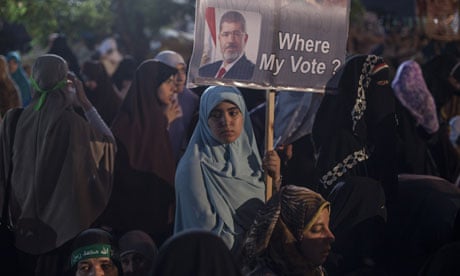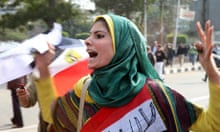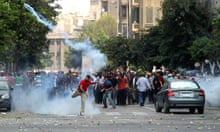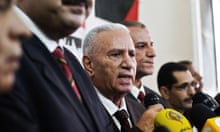The most important pretext for the ousting of President Morsi was the existence of division in Egypt. But today the division is deeper and the polarisation is wider. My support for the 30 June movement in opposition to Morsi changed after the military coup, which went against all the gains and values of the 25 January revolution. Its nature became obvious to me as I watched the killing of protesters, the incarceration, kidnapping and forced disappearance of thousands of coup opponents, and the closure of satellite TV channels.
Clearly, the leaders of the military takeover have something to conceal from the watchful eyes of the world. That explains why I was recently refused entry into Egypt. I now feel I have a responsibility to warn the world of the fact that a fully fledged despotic regime is seeking to reinforce its foundations in the country. The 25 January revolution guaranteed freedom of expression, of assembly and organisation. All these freedoms have been crushed in the aftermath of the coup.
It is unrealistic and unfair to believe Morsi was responsible for the failure to achieve economic prosperity within a year of his presidency. The man inherited a huge legacy of failure and institutional collapse from the previous regime. Furthermore, it has now become obvious that most of the state institutions, including the judiciary, the army, the security apparatus and most of the government departments, stood against him. They acted in a co-ordinated manner to foment a crisis aimed at impeding the president and forcing failure on him.
But the success of heads of state or government is measured more by their respect for civil and political rights than by economic prosperity. Morsi passed this tough test by guaranteeing these rights when, in fact, his opponents enjoyed more freedom than his own supporters. Compare this to what has been happening to his supporters since the coup: hundreds have been detained, killed or wounded as they peacefully protested.
Perhaps one of the few positive aspects of the coup is that it has discredited the claim thatthat that the state had been taken over by the Brotherhood under Morsi. The ministers in charge of defence, the interior and foreign affairs, and many other ministers and holders of senior government posts, are among the supporters of the coup. They were appointed by Morsi but are all opponents of the president, of his party and of his community. Egypt is moving on from the lie of Brotherhood takeover to the reality of state militarisation.
It is incumbent on every person who stands up for the values of democracy and the right of the people to choose their rulers unequivocally to reject the coup. The peoples of the Arab spring countries, including my own, Yemen, observe with concern the events in Egypt, where the will of the military has taken over the free will of the voters.
The repercussions of the coup on nascent democracies in the Arab world will be destructive. People may soon lose faith in the democratic process, paving the way for the revival of extremist groups. It is dreadful to imagine the long-term consequences of frustration with democracy. Al-Qaida and those sympathetic to it have always mocked the Muslim Brotherhood, telling them that the solution would not come via ballot boxes, but through bullets. The coup serves to strengthen the radicals, interrupting the course of peaceful change.
Despite what they've been subjected to, the Brotherhood has protested peacefully. Its restraint has averted civil war. But Morsi and his supporters hold the card of democratic and constitutional legitimacy, and are unlikely to agree to any settlement that does not do their claims justice.
The popular rallies at Rabaa al-Adawiya and other squares across Egypt will defeat despotism and terrorism in the long run. But in the meantime, any solution that fails to restore the public's confidence in the ballot box and falls short of alleviating the sense of victimhood in the Morsi camp will be doomed to failure.





